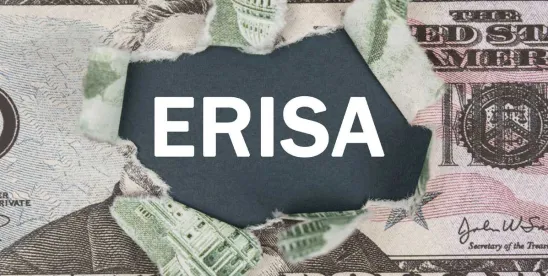Key Takeaways
- In October 2024, SCOTUS granted review of Cunningham v. Cornell University to provide guidance on certain pleading standards in ERISA litigation claims, with oral arguments scheduled for January 2025.
- Employee benefit plan sponsors can take steps now to mitigate litigation risk while SCOTUS considers the issues.
ERISA Class Actions – A Growing Trend
In recent years, a number of class action lawsuits have been filed against large employers and institutions, which generally assert theories related to breaches of fiduciary duty under the Employee Retirement Income Security Act of 1974 (ERISA). More specifically, several of these cases are brought by participants in defined contribution plans, alleging that the plan engaged in a prohibited transaction by paying unreasonable recordkeeping costs in violation of applicable fiduciary standards. One such case, Cunningham v. Cornell University, was recently selected for review by the Supreme Court of the United States to decide what pleading standard applies with respect to claims asserting a breach of fiduciary duty stemming from an alleged prohibited transaction.
Section 406(a) of ERISA forbids plan fiduciaries from engaging in prohibited transactions, which are transactions involving the furnishing of goods, services, or facilities between the plan and a party in interest. There are multiple established exemptions for arrangements that would otherwise be found to be a prohibited transaction. The exemption from a determination of a prohibited transaction that is central to the Cunningham case is found in section 408(b)(2) of ERISA, which exempts from a prohibited transaction determination a contract or arrangement for necessary services to the plan that only results in the payment of reasonable compensation.
In the Cunningham case, the petitioners (who are participants in certain Cornell University retirement plans (the “Plans”)) alleged that Cornell, as plan fiduciary, paid recordkeeping and administrative services fees to several third-party administrators who provided services to the Plans. Petitioners further allege that after establishing this fact, the evidentiary burden should shift to Cornell to establish that the fees paid are reasonable and satisfy the prohibited transaction exemption of ERISA section 408(b)(2). Cornell, on the other hand, argued that petitioners failed to plausibly allege that the payments made to recordkeepers were unreasonable, and thus failed to state a prohibited transaction claim. The Second Circuit ultimately agreed with Cornell and concluded that the prohibited transactions in section 406(a) should not be read in isolation, and instead should be interpreted in conjunction with the exemptions in section 408.
Prohibited Transactions and Uncertain Pleading Standards
Circuit Courts are divided on what specific facts plaintiffs must establish to state a claim alleging plan fiduciaries have entered into a prohibited transaction. Specifically, courts have struggled with determining whether a successful prohibited transaction claim simply requires a plaintiff to establish that a prohibited transaction occurred, and then forcing the defendant to prove that the services were necessary and that the fees paid were reasonable, or if plaintiffs must establish both that a prohibited transaction occurred in addition to certain elements (which vary by Circuit court) not specifically contained in section 406(a).
To date, the Eighth and Ninth circuits have applied a narrow reading of section 406(a), and generally only require plaintiffs to show that there was a transaction with a party in interest to survive a motion to dismiss. These circuits treat the exemptions to prohibited transactions in Section 408 as affirmative defenses which have no bearing on the plaintiff’s pleading standards. Conversely, the Third, Seventh, and Tenth Circuits have interpreted section 406(a) more broadly, and have determined that plaintiffs must plead additional facts, such as an intent to benefit the party in interest, to support their claims.
Proactive Steps to Mitigate Risk
The Supreme Court is scheduled to begin oral arguments in January 2025. The outcome of the Cunningham v. Cornell case will undoubtedly offer some clarity on what pleading standards apply when plaintiffs assert a breach of fiduciary duty claim resulting from prohibited transactions. As the assertion of these types of cases continue to grow in frequency, employers should take proactive steps to amend their employee benefit plans to safeguard against the looming threat of participant litigation.
Contributor: Morgan Schultz







 />i
/>i
